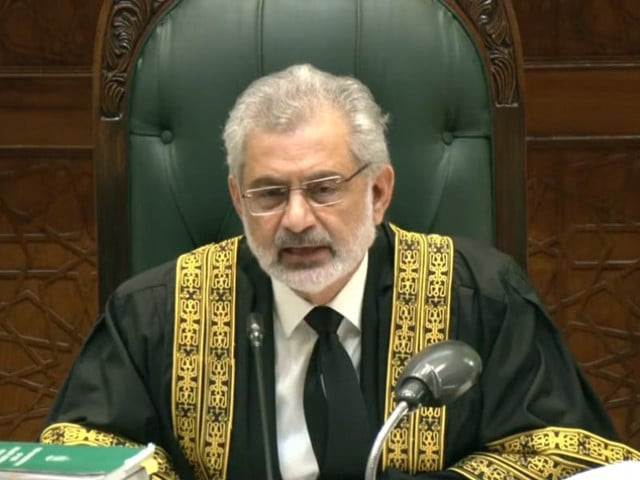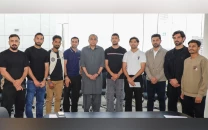Parliament must be respected: CJ
sa says Practice and Procedure Act does not transfer powers outside SC

Chief Justice Qazi Faez Isa on Tuesday stressed the need to give due respect to parliament, warning that a failure to do so could result in the country being governed not by its Constitution but by the verdicts delivered by judges.
Heading a full court on petitions against the Supreme Court (Practice & Procedure) Act, 2023, Chief Justice Isa heard the councillors of many petitioners, including the Pakistan Tehreek-e-Insaf (PTI).
During the hearing, the chief justice as well as other members of court raised several queries.
This was the second full court hearing of the case. And like the previous hearing, the proceedings, which continued for about six-and-a-half hours, were also broadcast live. The court declared that the proceedings would be concluded on Monday after listening to all the parties.
In their arguments, the lawyers, who had challenged the act, also admitted that Article 184(3) – which pertains to the suo motu powers of the apex court – had been misused and overused in the past.
During the hearing, the chief justice remarked that the Practice and Procedure Act limits the powers of the chief justice on one hand but, on the other, divides these powers among two other judges.
Chief Justice Isa pointed out that the law would also apply to future chief justices and judges.
“At first, I considered not presiding over this case, but then I realised it would have implications for everyone,” the CJP remarked.
The lawyer for the petitioner said that it was not his personal case, rather it pertained to the entire nation. However, the chief justice told him that “neither you are the representative of the people nor are we; so, speak your mind”.
Read: SC to hear challenge to Act curtailing CJ’s powers
Chief Justice Isa asked the lawyer that when he spoke about the independence of the judiciary, was “it unique or is it for the people and their rights, [or] is it a standalone concept that should be defended”.
He further asked if tomorrow parliament enacted a law to give priority to the cases of widows, would the legislation affect the independence of judiciary.
At one point, the chief justice asked the PTI’s lawyer, why the arguments he was presenting in the court were not raised in parliament.
The lawyer replied that PTI's exit from parliament was a political decision and that he had not come to the court to “defend the political decision of any party”.
The chief justice said that this law might benefit the petitioner in the future.
The lawyer replied that his party might give constitutional protection to the law at a later stage. The lawyer said that the chief justice of Pakistan, the president, and the prime minister had sworn an oath to protect the Constitution.
However, the chief justice remarked, whenever martial law was imposed, everyone surrendered.
“When martial law is imposed, the oath is forgotten but if parliament does something, everyone remembers the oath,” he said. He mentioned that there were many pictures in this courtroom, who forgot the oath when martial law was imposed.
The chief justice recalled that the apex court had upheld martial laws on several occasions, adding that even the judges violated their oath and allowed interference with the Constitution.
“Pakistan cannot be toyed with,” he continued. “Parliament must be respected.”
He then addressed the lawyer, saying that he was arguing that the authority of the individual should not be reduced but in fact, individuals had always caused harm to the country.
He added that if the example of martial law was taken, the country had been run by an individual alone.
He expressed that if one day the court declared a decision to be right, and the next day it could be deemed wrong, then “what will you say, is the Supreme Court the king of the jungle”?
In this manner, he continued, the country would not be governed by the Constitution, but rather by laws shaped by the decisions of judges.
Emphasising on the understanding of reality, and not assumptions, the chief justice observed that admitting a mistake was necessary for rectification.
He pointed out that the authority given by the act was within the Supreme Court, as the powers had not been transferred to anyone outside this building.
Sitting on the bench, Justice Ijazul Hassan questioned whether parliament couldn't amend a law by a majority vote. He also inquired about the necessity of the legislation at that particular time.
Justice Athar Minallah chimed in, suggesting that this question could be connected to the past. He added that the excessive use of Article 184(3) had contributed to the need for this act.
Justice Ayesha Malik raised the question as to who would hear the appeal against the full court decision, particularly what would happen to the appeal against the decision of the present case. The chief justice said that if 17 judges make mistakes, there should be no right of appeal.
The lawyer told the full court that he had instructions from the client that the law could not be upheld. However, the chief justice stopped him from talking about “taking instructions”, adding that the case pertained to Clause 3 of Article 184 of the Constitution.
When the lawyer urged the court to protect its own institution, the chief justice replied that the court had to protect parliament as well. Referring to the Practice and Procedure Act, Chief Justice Isa remarked that a chief justice would never make this law by himself.
Further, he conveyed to the lawyer that if all the apex court judges requested a full court session, and he didn't comply, then no one would be able to take action.
In a similar vein, he continued, who could address allegations of misconduct against the chief justice.
Chief Justice Isa pointed out that he was making decisions after consulting with his colleagues, emphasising that there was no distinction between him and the other judges in this consultation process. He also noted that Islamic principles also advocate for consultation.
As the hearing was adjourned until Oct 9, the court announced that it would hear from the lawyers representing various parties, including the Pakistan Muslim League-Nawaz (PML-N), the Muttahida Qaumi Movement (MQM), the PML-Quaid, the Supreme Court Bar Association, the Pakistan Bar Council and other concerned parties.
Headed by CJP Isa, the full court comprised Justice Sardar Tariq Masood, Justice Ijazul Ahsan, Justice Mansoor Ali Shah, Justice Munib Akhtar, Justice Yahya Afridi, Justice Aminuddin Khan, Justice Mazahar Ali Akbar Naqvi, Justice Jamal Mandokhel, Justice Muhammad Ali Mazhar, Justice Ayesha Malik, Justice Athar Minallah, Justice Syed Hasan Azhar Rizvi, Justice Shahid Waheed and Justice Musarrat Hilali.




1733130350-0/Untitled-design-(76)1733130350-0-208x130.webp)














COMMENTS
Comments are moderated and generally will be posted if they are on-topic and not abusive.
For more information, please see our Comments FAQ